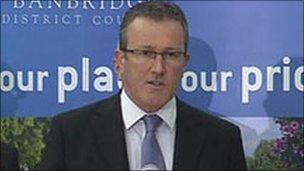Plan for traffic signs in Irish or Ulster-Scots
- Published

Conor Murphy said there would be a consultation period on the plans
The Department for Regional Development is considering introducing a range of bilingual traffic signs in either Irish or Ulster-Scots.
The minister, Conor Murphy, said there would be a consultation period on the plans which he described as a way of promoting minority languages.
Signs will have to be requested by a promoter through their local district council.
The proposals envisage any costs will be borne by the promoter for the signs.
The department said the policy would help it meet its commitments under the European Charter for Regional or Minority Languages
Mr Murphy said: "The policy is intended to facilitate the introduction of a number of certain bilingual traffic signs in Irish or Ulster-Scots for the specific purpose of promoting minority languages.
"We have obligations under the European Charter for the protection of minority languages and the proposed policy will permit the inclusion of either Irish or Ulster-Scots, on town or village welcome signs, some supplementary plate signs for example a 'school' warning sign and certain tourist signs."
The department said the promoter may be the local council in the case of town or village welcome signs, a local tourist operator in the case of tourist signs, or the manager of the facility in the case of supplementary plates.
'Pointless'
The plans have been criticised by the DUP, the Alliance Party and the Ulster Unionists.
DUP Strangford assembly member Michelle McIlveen said: "Given the range of problems on Connor Murphy's desk he should be focusing on more important matters rather than a pointless political exercise about bilingual signage.
"This is a Sinn Fein hobby horse and not a sensible proposal given the budgetary constraints faced by departments."
Ulster Unionist leader Tom Elliott said: "The cost of the consultation and provision of signs is outrageous, the money would be much better spent on repair of roads which are in an appalling state.
"The European Charter for Regional or Minority Languages does not place any responsibility on the department in respect of traffic signage and it should be recognised that this could be a politically sensitive issue and divisive."
The regional development spokesperson for Alliance, Anna Lo, said: "This plan will mean that their will be clear tribal demarcations in area because there can never be a sign featuring the three languages together.
"This is akin to people putting flags up in certain areas to mark out territory. This will be like an institutionalised mark of tribalism."
Traditional Unionist Voice leader Jim Allister said there was no compulsion under the Charter on Minority Languages to take the step, and claimed it was an attempt to erode "Northern Ireland's Britishness".
Copies of the consultation document are available on the Department for Regional Development, external website.